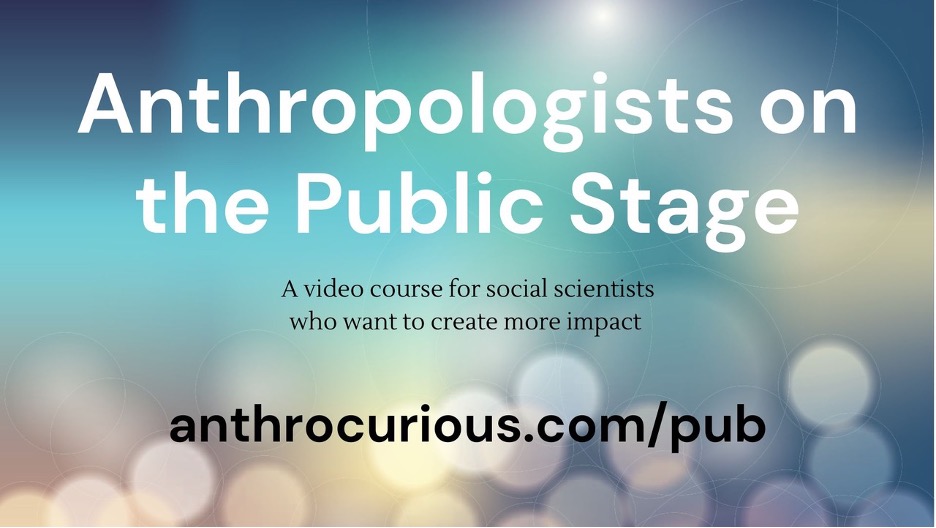An account is required to join the Society, renew annual memberships online, register for the Annual Meeting, and access the journals Practicing Anthropology and Human Organization
- Hello Guest!|Log In | Register
Anthropologists on the Public Stage
Elizabeth K. Briody, Adam Gamwell, Phil Surles, Dawn Lehman, and Jo Aiken

Anthropology has had a longstanding problem: its low public visibility. The effects in the US, UK, and elsewhere range from erroneous assumptions about the discipline, to still-too-few "seats at the table" in contributing to public conversations and debates, policy, and governance. Economists, psychologists, and political scientists are first among the social and behavioral scientists to be interviewed by journalists when local and national events take place, human actions are questioned, politics are debated, and new movies and books are reviewed. Many anthropologists have been asking: “Where are the anthropologists? Why aren’t members of the media talking to us?”
The truth is that many anthropologists possess neither the knowledge nor the experience to be effective in the public arena. We decided we wanted to help rectify this issue.
Fortunately, there has been a growing trend in anthropology toward a greater public presence, accelerated by COVID-19. With a small Global Initiatives Grant from the Wenner-Gren Foundation, we developed a web-based, modular training program to motivate and coach many more anthropologists and anthropology students to enter the public sphere. The result was the production of Anthropologists on the Public Stage; you can see the trailer here.
The six trainings include short video modules accompanied by specific exercises where trainees can practice the lessons they have been learning.
-
Develop an Idea Worth Sharing (09:25) introduces an effective strategy for sharing interesting anthropological insights with members of the general public. The exercise uses a step-by-step approach with questions and templates to bring out the best from the anthropologist’s work.
-
Connect with the Media (12:52) encourages trainees to learn about and build relationships with their local media. The exercise involves writing a pitch to an editor or journalist.
-
Tell a Great Story (13:52) helps trainees move back and forth between their data and insights to the art and practice of storytelling. The exercise involves identifying story details, developing an outline, telling the story to family and friends to generate feedback, revising the story, and finally practicing the delivery of the story.
-
Influence Policy Development (14:12) focuses on the various phases of policy work including developing, implementing, and evaluating policy. The exercise involves identifying a policy-relevant issue from one’s own research or experience, contacting others involved (e.g., policymakers, think tank officials), and addressing specific questions related to the issue.
-
Increase Public Awareness (22:36) highlights examples of anthropologists sharing their anthropological insights publicly whether face-to-face, staging an event, or using the media to advantage. The exercise involves identifying and planning a project or activity to help members of the general public learn about anthropology and its value.
-
Promote Yourself and Anthropology (14:03) has a dual focus: a) what anthropologists can learn from other disciplines to improve their ability to share what they know, b) how can the principles and techniques found outside anthropology can help shape the stature of individual anthropologists. The exercise involves writing an engaging set of tweets or TikToks about some anthropological insight and its relevance for a particular audience.
We kept several elements in mind as we worked on this project. First, our most important goal was to help educate students, instructors, and practitioners about the skills necessary for engaging with the general public. Second, we organized each module to deliver specialized knowledge along with general advice and tips reinforced by the narrator.
Third, we selected our interviewees because they possessed significant experience in high-visibility occupational roles or in specialized public-facing activities. Finally, our interviewees reflected a broad range of diversity including gender, race/ethnicity, age/experience, nationality, subfield, and work sector so that they would appeal to and reflect the broadest possible diversity of prospective trainees.
Of course, the “proof is in the pudding.” We encourage you to log in to take advantage of Anthropologists on the Public Stage as you identify the insights you want to share, the audience you hope to influence, and the way in which you will reach that audience. All six trainings will be posted on https://www.anthrocurious.com with the release dates as follows:
- November 8, 2022: Develop an Idea Worth Sharing
- December 8, 2022: Connect with the Media
- January 8, 2023: Tell a Great Story
- January 22, 2023: Influence Policy Development
- February 5, 2023: Increase Public Awareness
- February 19, 2023: Promote Yourself and Anthropology
We know that anthropologists have the stories, examples, and analysis. By shifting some of our time toward educating the general public, we not only help the world understand what anthropology is and offers, but we also have a far greater chance of enhancing our impact by changing perspectives, policies, programs, and practices.

Cart
Search